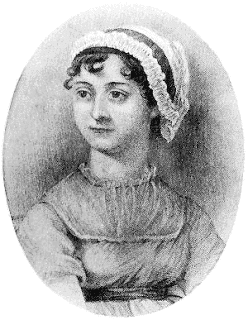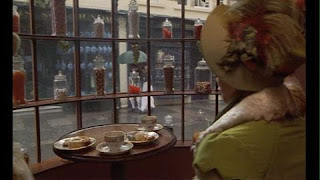 Today we welcome Marsha Altman, whose book The Darcys and the Bingleys: A Tale of Two Gentlemen’s Marriages to Two Most Devoted Sisters was released this month.
Today we welcome Marsha Altman, whose book The Darcys and the Bingleys: A Tale of Two Gentlemen’s Marriages to Two Most Devoted Sisters was released this month.
Marsha, big congrats on the book and thanks for coming to visit today! Marsha is offering a signed copy of the book to a lucky winner–your comment or question enters you in the drawing.
We’ve seen a lot of Austen sequels lately. What makes yours stand out?
Every author has their niche, the story they want to tell within the niche of Pride and Prejudice sequels. Some people want to speculate on the sex lives of the married Darcys – all well and good of it’s done well – some want to focus on marrying off the remaining cast, and one person writes cozy mysteries. I value uniqueness very much, which is why I’m attracted to the stories that haven’t been told yet. Georgiana’s gotten married in numerous sequels, Elizabeth and Darcy have a great marriage life but the kid is slow in coming – I wanted to do something about the Bingleys, and about the friendship of Darcy and Bingley.
 Also my book has some fight scenes. I like swords. Also guns, wooden legs of chairs, candlesticks – whatever works.
Also my book has some fight scenes. I like swords. Also guns, wooden legs of chairs, candlesticks – whatever works.
How did you come to write this book?
It started as a short story meant to be between Darcy and Bingley about their pre-wedding jitters and expanded from there. Some people take offense to the idea that Darcy would be experienced upon entering his marriage, which is historically improbable (he is roughly 29 when he marries, depending on when his birthday occurs, which is never mentioned in the book). But Bingley, who’s more sweet and innocent, could be a virgin. So he goes to his best pal for awkward advice. I found the notion amusing. Everything that came after that was just more ideas I had. I told myself I would stop writing when I ran out of things to do with the characters or they died, and I haven’t had it in me to kill any of them yet.
How did you feel about taking on Jane Austen?
 I think I could take her. I’m probably taller than her, and I have martial arts experience. On the other hand she was a good dancer and got plenty of exercise, and we’re both pretty sickly, so it might be an even match. I wouldn’t underestimate her.
I think I could take her. I’m probably taller than her, and I have martial arts experience. On the other hand she was a good dancer and got plenty of exercise, and we’re both pretty sickly, so it might be an even match. I wouldn’t underestimate her.
Now for the serious answer, in terms of “taking on” the length and breadth of her work by attempting to continue it, I don’t worry about it because it simply can’t be done. I’m not one of the foremost novelists in the British language and I wouldn’t be even if I changed my citizenship. I’m trying to have fun with her characters. As to whether she would mine, Miss Austen has posthumously endured her nephew and extended family publishing all of her unfinished writing and personal letters for profit, numerous sequels and adaptations, books analyzing her personal life, and even movies about her starring actresses wearing heavy lipstick. So, if she’s been spinning in her grave, she’s probably tired by now and may well have gotten over it. That or she understands imitation is the sincerest form of flattery, if that phrase existed in the Regency period.
What sort of research did you do, and did you discover anything
surprising?
 I’m a historian by nature. It was my undergraduate degree and I almost went for a PhD in it but got fed up with graduate academia. Therefore I had some initial trouble navigating the Regency fiction waters. This a culture you’re far more familiar with than I am, as I’ve not read much Regency romance outside of Jane Austen and Austen fanfic, but the world as it is portrayed in Regency fiction and Regency romance in conventional, modern publishing seems to be a world contrived from actual history and some assumptions about history based on writers from the period, Austen being the main one. Some people don’t realize that Jane Austen wrote contemporary fiction; I’m writing historical fiction. They’re two different things. I can’t write the story I think she would have written. I can only write a story set in that period of history using characters that resemble hers. I decided to rely on historical accuracy over Regency writing traditions. While certainly not true of everything (especially “Risky” Regencies!), the Regency period is presented in fiction as this very sanitized, rule-bound world. This is the world Jane Austen wrote about. It doesn’t mean it was the world that actually existed during the Regency period.
I’m a historian by nature. It was my undergraduate degree and I almost went for a PhD in it but got fed up with graduate academia. Therefore I had some initial trouble navigating the Regency fiction waters. This a culture you’re far more familiar with than I am, as I’ve not read much Regency romance outside of Jane Austen and Austen fanfic, but the world as it is portrayed in Regency fiction and Regency romance in conventional, modern publishing seems to be a world contrived from actual history and some assumptions about history based on writers from the period, Austen being the main one. Some people don’t realize that Jane Austen wrote contemporary fiction; I’m writing historical fiction. They’re two different things. I can’t write the story I think she would have written. I can only write a story set in that period of history using characters that resemble hers. I decided to rely on historical accuracy over Regency writing traditions. While certainly not true of everything (especially “Risky” Regencies!), the Regency period is presented in fiction as this very sanitized, rule-bound world. This is the world Jane Austen wrote about. It doesn’t mean it was the world that actually existed during the Regency period.
 Roger Sales wrote a very interesting book, Jane Austen and Representations of Regency England. In the 1995 edition he included a postscript about the BBC adaptation and what was altered to match people’s perceptions of what the Regency period was over what it actually was. Earlier in the book, he comments that when Jane Austen’s letters were first published, it was during the Victorian period, and they were edited. Not that there was anything scandalous in there, but references to mundane things like bedbugs and illness were removed for a Victorian audience, that wanted to see Jane Austen in the sanitized world of her fiction.
Roger Sales wrote a very interesting book, Jane Austen and Representations of Regency England. In the 1995 edition he included a postscript about the BBC adaptation and what was altered to match people’s perceptions of what the Regency period was over what it actually was. Earlier in the book, he comments that when Jane Austen’s letters were first published, it was during the Victorian period, and they were edited. Not that there was anything scandalous in there, but references to mundane things like bedbugs and illness were removed for a Victorian audience, that wanted to see Jane Austen in the sanitized world of her fiction.
To do the things I really wanted to do in the story, especially the later half where there’s more drama and violence, I decided to take a more historical route, which means people getting shot and having gruesome surgeries and some people dying. I saw no reason to focus on the mechanics of sex – plenty of more competent romance writers have done that – but I didn’t feel a need to leave out some of the other un-polite parts of Polite Society. It was too limiting to do otherwise. The characters still act appropriately (most of the time), but they encounter the gritty parts of their world whether they like it or not. It’s not very “Austen-esque” but it was a decision on my part and I’ve stuck with it ever since.
You tell the story of two characters who aren’t wholly sympathetic–
Bingley himself and his sister Caroline. How did your perceptions of
them change?
 First off, Bingley. Despite the fact that he was inspired by Simon Wood’s portrayal of him in the 2005 movie, where his lines were a bit dumber than the lines given to the BBC Bingley (Crispin Bonham-Carter), I had to give Bingley some intelligence, just not in the realm of social intercourse.
First off, Bingley. Despite the fact that he was inspired by Simon Wood’s portrayal of him in the 2005 movie, where his lines were a bit dumber than the lines given to the BBC Bingley (Crispin Bonham-Carter), I had to give Bingley some intelligence, just not in the realm of social intercourse.
 Bingley is a foil to Darcy. He’s comfortable in social situations but not a great wit; Darcy is uncomfortable before strangers but always has something intelligent to say. They make a great pair in terms of dialogue, and you could see how one would rely on the other for their perceived deficiencies. Eventually it becomes a very brotherly rivalry, and Bingley actually bests Darcy a few times, though largely at things beyond his control. His father was a brilliant businessman, so I gave Bingley a head for numbers and languages, which plays a bigger role in future books. But he remains lovable and affectionate Bingley, which is key to the Caroline story.
Bingley is a foil to Darcy. He’s comfortable in social situations but not a great wit; Darcy is uncomfortable before strangers but always has something intelligent to say. They make a great pair in terms of dialogue, and you could see how one would rely on the other for their perceived deficiencies. Eventually it becomes a very brotherly rivalry, and Bingley actually bests Darcy a few times, though largely at things beyond his control. His father was a brilliant businessman, so I gave Bingley a head for numbers and languages, which plays a bigger role in future books. But he remains lovable and affectionate Bingley, which is key to the Caroline story.
 I wanted to work with Miss Bingley because it’s territory very few people have done and I don’t think in any published work. There’s a few scattered fanfics I can name, but mostly in sequels she’s either not there, still scheming, or outright psychotic. While all of Austen’s writing on her would lend itself to that, it was more challenging to do the opposite. Besides, why would she pursue Darcy after he married? She’s too calculating for that. What would she do with her time? She makes some bad decisions, but Bingley is good enough to know she’s in trouble and Darcy is good enough to know he should help. Portraying the Bingley siblings affectionately, after they’ve lived their whole lives together even after the marriage of the eldest sister, has been something I’ve enjoyed doing. I want to make people love these characters. I want to give them a chance to be redeemed.
I wanted to work with Miss Bingley because it’s territory very few people have done and I don’t think in any published work. There’s a few scattered fanfics I can name, but mostly in sequels she’s either not there, still scheming, or outright psychotic. While all of Austen’s writing on her would lend itself to that, it was more challenging to do the opposite. Besides, why would she pursue Darcy after he married? She’s too calculating for that. What would she do with her time? She makes some bad decisions, but Bingley is good enough to know she’s in trouble and Darcy is good enough to know he should help. Portraying the Bingley siblings affectionately, after they’ve lived their whole lives together even after the marriage of the eldest sister, has been something I’ve enjoyed doing. I want to make people love these characters. I want to give them a chance to be redeemed.
 How did your perceptions of Elizabeth and Darcy change? Are they
still the ultimate, perfectly matched couple?
How did your perceptions of Elizabeth and Darcy change? Are they
still the ultimate, perfectly matched couple?
It’s a difficult act to make Darcy and Elizabeth partners in every sense of the word without betraying their essential characters. Elizabeth is too self-assured, Darcy is too distant and uneven. Their love transcends it, and they learn the lessons of Pride and Prejudice and don’t repeat them, but upon their marriage they have to learn to lean on each other when both are used to being very independent. I had no interest in writing a story where they fight for any extended period of time, but there are still subtle battles for dominance and understanding in the relationship. Most of it is expressed quickly or unexpressed but still present. In a marriage, as two couples move towards each other physically and emotionally, it’s a bit like a battle even if it isn’t one – there are advances and there are concessions, however minor, that cause the forming of a stable and lasting relationship. The foundation is there but it still takes work to build on it, and even when caught up in other plotlines, Darcy and Elizabeth are still working towards the ultimate companionship a true marriage can bring.
What’s next for you?
Several books in this series. They get increasingly dramatic – there are only so may wedding one-liners you can do – but I hope to maintain the undercurrent of humor to ease the burden of the challenges the characters face. There’s more on the Darcy family history that takes awhile to be fully revealed, the other characters get a bit caught up in some of the political things going on around them without being political themselves, and of course there’s kids. Lots of kids. I really need a good genealogy chart.
Also I write sci-fi, so I’ll probably get back to that when I’m done with the series.
How do you intend to end the series?
They all get eaten by dinosaurs.
 First, in the interests of encouraging others to waste time online, you can now find me on Twitter, not that I have anything particularly interesting to say there.
First, in the interests of encouraging others to waste time online, you can now find me on Twitter, not that I have anything particularly interesting to say there. Navy Seals. Close and almost a cigar–Persuasion is rife with manly men in uniforms, the cream of the Royal Navy, muscles rippling beneath their skin tight uniforms.
Navy Seals. Close and almost a cigar–Persuasion is rife with manly men in uniforms, the cream of the Royal Navy, muscles rippling beneath their skin tight uniforms.















